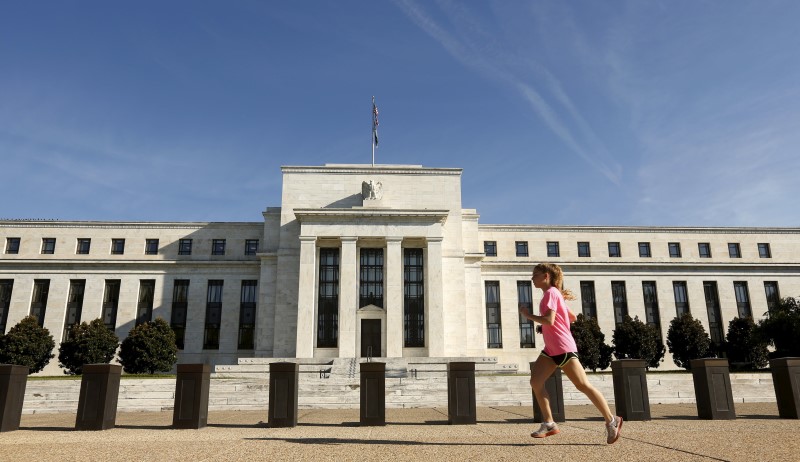By David Randall
NEW YORK (Reuters) - A record year for debt-funded stock buybacks may soon become even more rewarding for shareholders.
The Federal Reserve's decision to delay raising interest rates for the first time since the 2008 financial crisis will likely encourage companies to take out more debt to repurchase their own shares or issue special dividends before the end of the year, adding to the almost $1 trillion that companies were already on pace to return to investors this year, fund managers and analysts say.
That's because, with historically low interest rates now likely to extend to at least December, companies are "now in a sort of borrowing nirvana," said a bond strategist, who asked not to be quoted by name because he recently left one firm and has not yet officially started at his new position.
While there is no way to track debt taken out for share buy-backs alone, U.S. corporations have taken out $59.4 billion in debt this year - or about 8 percent of the total amount of U.S. corporate debt issued - to fund special dividends to shareholders, according to data from Dealogic. That is more than double the $28.4 billion issued for special dividends in 2014, which are another way that companies reward shareholders and tend to parallel buyback purchases.
Interest rates at near zero have increasingly prompted companies flush with cash to issue debt to fund share buybacks. Apple Inc (NASDAQ:AAPL), for instance, has issued $23.6 billion in debt this year despite having more than $200 billion in cash, part of its plan to buy-back up to $140 billion in shares by the end of March 2017. MetLife Inc (NYSE:MET)., meanwhile, sold $1.5 billion in bonds in June to fund share buybacks, while having more than $10 billion in cash on its balance sheet.
Executives have several reasons to take out longer-term debt to reward shareholders now. A blue-chip company will likely pay about 2.2 percent interest on a 5-year bond while at the same time paying out about 3 percent in dividends a year, making it less expensive to buy shares outright, bond analysts said.
And, with pay and bonuses often tied to share performance, corporate management teams have an incentive to spend money to bolster share prices, especially in a time of slow earnings growth.
"On a short-term basis, buybacks create more demand even if the stock itself isn't all that attractive," said Howard Silverblatt, senior index analyst for S&P Dow Jones Indices.
SHAREHOLDER REWARDS
Already, some executives are discussing issuing debt to repurchase shares in the wake of the Fed's decision.
"I could foresee a situation where we're going to continue to buy back more shares over the next year or so. It could put the credit rating at risk. And I would tell you that that's okay," said United Technologies Corp (NYSE:UTX) chief executive Greg Hayes, speaking at a Morgan Stanley (NYSE:MS) investor conference on Thursday. "It makes pretty good sense to buy back stock when I'm paying more in dividends than I'm paying in interest to buy it back."
While there is no way to quantify exactly how much share buyback have helped stock performance, approximately 20 percent of the companies in the S&P 500 have "significantly" decreased share counts year over year for the past 6 quarters, Silverblatt said.
As a result of cutting the number of shares available, these companies have bolstered such metrics such as earnings per-share, helping to make companies look like they are doing better even if their absolute performance remained the same, he said.
The companies that have been buying back stock the most aggressively have not outperformed this year, however. The S&P 500 Buyback Index, which tracks the performance of the 100 stocks with the highest buyback ratios in the S&P 500 - a group that includes Coca-Cola Enterprises Inc (NYSE:CCE), Cameron International Corp (NYSE:CAM), and Motorola Solutions Inc (NYSE:MSI) - is down 6.8 percent for the year to date, a performance about 1 percentage point worse than the benchmark as a whole, according to Thomson Reuters data.
Through August, companies in the S&P 500 had authorized $598.5 billion in share buybacks, the largest on record and more than the full-year totals from 2008 to 2012, according to Robert Leiphard, an analyst at Birinyi Associates. Companies are on pace to announce $897 billion in buybacks for the full year, which would top the $863 billion authorized in 2007 as the largest of all time, he said.
AMOUNT OF DEBT
Some analysts and fund managers now expect those numbers to increase by the end of December.
"This might have reopened the window" for companies that had expected an increase in interest rates to curb their share repurchase programs, said Scott Kimball, a senior portfolio manager with Taplin, Canida and Habacht.
Companies had front-loaded their debt issuance this year to get ahead of the expected rate hike in September, said Hans Mikkelsen, head of U.S. high grade credit strategy at Bank of America Merrill Lynch (NYSE:BAC) Global Research.
Yet now that the Fed has added concerns about global economic weakness to its outlook, historically low rates may last into next year, he said. At the same time, bond investors will likely continue buying new issues, given the net inflows to fixed income mutual funds, he said.
"People are starting to look at that and saying that the Fed will not act for a long period of time," he said.
